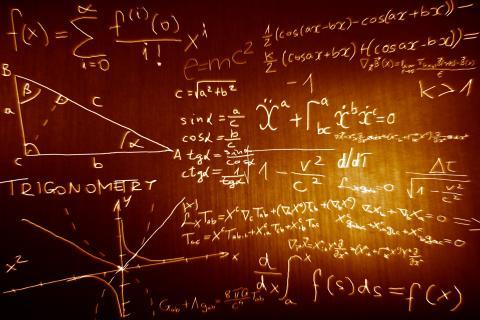Programme overview

The mission of this PhD programme is to combine specialised theoretical training in the Mathematical Sciences with the application of methodological approaches from Mathematics and Statistics to the treatment of problems from the applied sciences.
The goal is to train highly qualified scholars capable of conducting academic research in fundamental sciences, engineering, architecture, economics, finance, biomedicine, or industrial research in bio- and nanotechnologies, the pharmaceutical industry, healthcare, and governance.
The PhD programme in Mathematical Sciences rests on two pillars: a high-level mathematical education is fundamental to tackle theoretical and applied problems with the proper methodological rigour; Mathematics plays a prominent role in avant-garde technological contexts, which are a source of challenging interdisciplinary problems of relevant interest to the Mathematical Sciences.
Training and research activities span the following main subject areas:
ALGEBRA AND GEOMETRY
- Cryptography and number theory. Cryptography and Number Theory, focusing on Diophantine equations, continued fractions, linear recurrent sequences, group actions, pseudo-random number generators, digital signatures, cryptanalysis, and cryptographic applications to blockchain.
- Geometry and topology. The study of Geometry and Topology from an algebraic, differential, computational, and applied point of view, with a special focus on projective varieties, tensors, vector bundles, theory of subvarieties, geometric flows and geometry of PDEs, and topological aspects of artificial intelligence.
MATHEMATICAL ANALYSIS
- Dynamical system analysis. The analysis and control of network dynamics, with applications to engineering, economic, financial, and biological systems; the study of multi-agent systems of players with strategies: well-posedness results, mean-field limits, and their stochastic formulation.
- Harmonic and functional analysis. The study of functional inequalities, singular integrals and functional calculi for Laplacians and sub-Laplacians on manifolds, groups, and graphs.
- Variational models and PDEs. The study of the variational properties of nonlinear quantum graphs and hybrid with a geometric structure, in order to model quantum devices for applications in atomtronics and other quantum technologies; the study of uncertainty principles for Fourier-like transforms arising in harmonic and complex analysis and mathematical physics, from a measure-theoretic and variational perspective; the regularity theory for solutions to weighted parabolic PDEs and applications; the study of variational models for continuum mechanics, with particular applications to membranes and thin structures.
NUMERICAL ANALYSIS
- PDEs in unbounded domains. Innovative and efficient numerical methodologies for solving PDEs in unbounded domains, focusing on the coupling of boundary and virtual element methods and its application to wave propagation problems.
- Simulation of multi-scale coupled problems. Treatment of coupled multi-scale problems in complex domains through innovative domain decomposition techniques and polygonal/polyhedral discretizations.
- Numerical methods for highly complex PDEs. Strategies for enhancing fast numerical solution and optimization of highly complex models governed by PDEs: Physics Informed Neural Networks, Model Order Reduction, and High Performance Computing.
MATHEMATICAL PHYSICS
- Mathematical methods for multi-agent systems. Agent-based models – stochastic particle systems and their continuum limits, Monte Carlo simulation algorithms; continuum models – differential equations, integro-differential equations, collisional kinetic equations, qualitative characterization of their solutions, hydrodynamic limits, asymptotic descriptions, numerical simulations; applications to biology, ecology, medicine, econophysics, sociophysics.
- Continuum mechanics. Mathematical models in biology and medicine; Fluid mechanics, Solid mechanics, Biomechanics, Mechanobiology, Morphoelasticity; micro-swimmers and their control; applications in biomedicine (e.g. tumour growth, angiogenesis, cell migration, mechanical response of soft tissues); variational methods and differential geometry in continuum mechanics; nonholonomic mechanical systems and their control; mathematical modelling of metamaterials, gradient materials, and materials of fractional order; mathematical and mechanical models of cell migration; biomimetics models in particle swarm optimization.
- Nonequilibrium statistical mechanics. Models of anomalous transport of matter, energy etc.; perturbative and exact response theory for systems subjected to perturbations, which are described by dynamical systems or by stochastic processes; applications to physics (e.g. universality and phase transitions away from equilibrium), to biology (e.g. population dynamics, including bacteria), to nanotechnology (e.g. sensors and transport in nanotubes), to climate and environmental problems (e.g. characterization of the Earth temperature in space and time).
PROBABILITY AND STATISTICS, OPERATIONAL RESEARCH
- Probability. Stochastic processes, dependence models and their applications to biology and finance. Applications to biology focus on stochastic reaction networks, on their stationary regime, on multi-scale settings, and on model extensions driven by biochemistry, while in finance applications focus both on multi-asset derivative pricing and on the modelling and stochastic comparison of portfolios having dependent assets.
- Statistics. Methodological statistics and its fundamental role in data collection, analysis, and interpretation. Statistics as one of the pillars of data science and machine learning. Hierarchical modeling and Bayesian statistics for capturing complex relationships and dependencies among variables. Application in biology, spatial statistics, genetics, clinical trials, design of experiments.
- Operations research. Development of optimization models and solution algorithms for a wide range of applications, including marketing, logistics, production scheduling, and engineering design. The applied methodologies include: stochastic and robust optimization; dynamic programming, reinforcement learning, and simulation-based optimization; matheuristics for combinatorial optimization, possibly integrated with machine learning.
Thanks to the interplay between theoretical, foundational, and applied aspects of the research in Mathematics and Statistics, the PhD programme in Mathematical Sciences provides a training specifically focused on the creation of innovative research approaches. These are essential to adequately support innovation and technological transfer processes, which are more and more demanding in terms of original theoretical and methodological strategies to manage the increasing complexity of socio-economical paradigms.
-
Type of programme:
PhD programme -
Department:
-
Coordinator:
-
Vice coordinator:
-
Admissions:
Open, through competitive selection